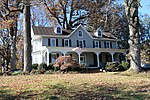Woodstock College
1869 establishments in Maryland1974 disestablishments in MarylandCatholic seminaries in the United StatesCatholic universities and colleges in MarylandDefunct Catholic universities and colleges in the United States ... and 6 more
Defunct private universities and colleges in MarylandEducational institutions disestablished in 1974Incomplete lists from August 2008Jesuit universities and colleges in the United StatesUniversities and colleges established in 1869Woodstock College

Woodstock College was a Jesuit seminary that existed from 1869 to 1974. It was the oldest Jesuit seminary in the United States. The school was located in Woodstock, Maryland, west of Baltimore, from its establishment until 1969, when it moved to New York City, where it operated in cooperation with the Union Theological Seminary and the Jewish Theological Seminary. The school closed in 1974. It was survived by the Woodstock Theological Center, an independent, nonprofit Catholic research institute located at Georgetown University in Washington, D.C.
Excerpt from the Wikipedia article Woodstock College (License: CC BY-SA 3.0, Authors, Images).Woodstock College
Old Court Road,
Geographical coordinates (GPS) Address Nearby Places Show on map
Geographical coordinates (GPS)
| Latitude | Longitude |
|---|---|
| N 39.335555555556 ° | E -76.87 ° |
Address
Woodstock Job Corps Center
Old Court Road 10900
21163
Maryland, United States
Open on Google Maps




